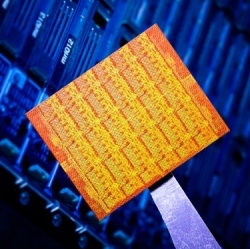
By using electric voltage instead of a flowing electric current, researchers from UCLA’s Henry Samueli School of Engineering and Applied Science have made major improvements to an ultra-fast, high-capacity class of computer memory known as magnetoresistive random access memory, or MRAM.
The UCLA team’s improved memory, which they call MeRAM for magnetoelectric random access memory, has great potential to be used in future memory chips for almost all electronic applications, including smart-phones, tablets, computers and microprocessors, as well as for data storage, like the solid-state disks used in computers and large data centers.
MeRAM’s key advantage over existing technologies is that it combines extraordinary low energy with very high density, high-speed reading and writing times, and non-volatility — the ability to retain data when no power is applied, similar to hard disk drives and flash memory sticks, but MeRAM is much faster.
